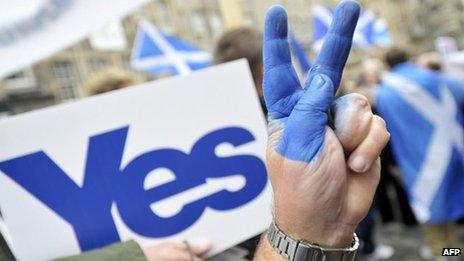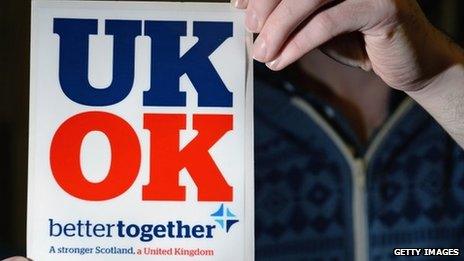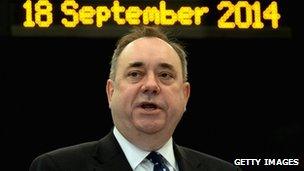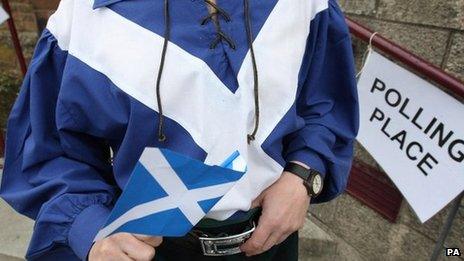Scotland's referendum: Time to consider, time to choose
- Published

The historic year has come - in little over nine months' time Scots will decide their country's future
Timing matters in politics. The referendum on Scottish independence - and its associated campaign - coincide with the European elections in May this year and the run-up to the UK General Election in May next year. This is, needless to say, no coincidence.
Alex Salmond's calculation, Alex Salmond's hope is that these contests - and especially the Westminster election - will distract the minds of his political opponents when it comes to the referendum.
He hopes, in short, that they will be fighting each other for seats, rather than fighting him for referendum votes. That is, partly, why the date for the referendum was deferred until September this year.
I suspect this may prove somewhat illusory. Yes, there are tensions on the Unionist side, most notably among Labour activists who find the connection with the Conservatives uncomfortable.
However, the issue at stake in the referendum is so compelling, so overwhelming that it will mostly subsume the differences - the very real differences - between the pro-Union parties which will feature in the European and Westminster contests.
I believe Mr Salmond's opponents will contrive, mostly, to maintain their collective focus upon the referendum while simultaneously scrapping over European and Commons votes.
But, of course, there was another calculation at play in the date selected for the referendum. Alex Salmond hopes that the economy will, by the autumn, be sufficiently stabilised that the people of Scotland might feel confident enough to opt for independence.
Independence movements frequently advocate flight. They may urge a people to throw off an external dictator or despot, to be free of tyranny. The Scottish offer is not remotely like that. For all its problems, Scotland is a mature, relatively prosperous, west European democracy. The SNP offer is predicated upon further empowering an already successful nation, regaining, as they would put, it the normal functions of statehood.

The Yes Scotland campaign will focus on the questions of individuals

The Better Together campaign will look at emphasising British links
Which means that the economy is central - as is reassurance. This has been, indeed, the doubt and reassurance referendum. For those advocating the Union, it has mostly been sufficient thus far to cast doubt upon the independence offer. To say: well, you could be independent but have you considered... the currency, or the EU, or NATO, or whatever. The Nationalists have been obliged to offer reassurance, in as much as they can, on every last point.
In practice, it is difficult, if not impossible, to offer complete reassurance - particularly where elements of the offer lie in external hands. Which is the case, for example, with EU or NATO membership. And indeed with the sterling zone which would require support from the rest of the United Kingdom.
Not an election
In each case, Scottish ministers have argued that the compelling force of common interest would drive the solutions they advocate.
To be clear, all this is entirely understandable - and, indeed, an inevitable function of this asymmetrical referendum. This is not a General Election with competing manifesto offers. Rather, it is a proposition from one side, for independence, under assault from rivals.

Alex Salmond has hopes for the Scottish economy by the time of the vote
However, the White Paper on independence, external - whether you approve it or scorn it - opens two avenues for consideration. One, alongside the reassurance on issues like the currency, the Nationalists are now making an explicit retail offer on issues like pensions, benefits and childcare. Again, rivals will challenge the costings - but that is the offer which will be marketed round the doorsteps of Scotland.
Secondly, the very existence of the White Paper challenges the supporters of Union to say what they would do in the event of a No vote in the referendum. The Liberal Democrats already have a federal offer in play. In the spring, both Labour and the Conservatives will outline plans to reform Holyrood, perhaps involving enhanced powers.
Will these offers coalesce into a single Unionist position? I think not, at least not before the referendum. Too little time, too little agreement. However, as one put it to me, there may emerge a Venn diagram where there is obvious overlap between the various positions. That direction of travel might then be underlined, perhaps by the offer of a post-referendum convention, as advocated by Labour's Douglas Alexander, or perhaps by the promise to include enhanced Holyrood powers in each of the party manifestos.

So, where do the campaigns go next? I expect Yes Scotland to work on customising the White Paper. That is, discerning the individual concerns of individual households - and offering a tailored answer, drawn from the compendious published document.
I expect them, further, to challenge their rivals on that issue of a coherent offer to counter independence. What precisely, they will say, would No mean? On powers, on future funding.
And Better Together? I expect them to focus upon prosperity, powers and pride.....
On prosperity, they will restate their economic arguments, with further contributions from the Treasury
Powers will involve that endeavour to draw together the disparate thinking on the future of Holyrood
And pride? I expect Better Together to underline the British links which they say persist for even the most patriotic Scots.
Time. Time to campaign, time to consider, time to choose.